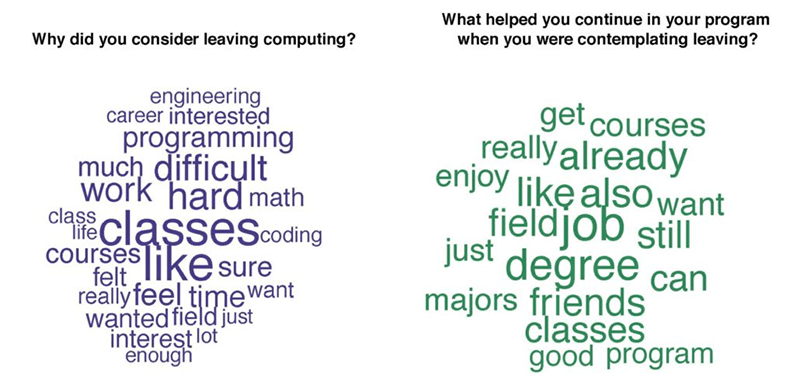Why Students Consider Leaving Computing
01-31-2017
Writer(s): Kristyn Childres
In 2015, the Computing Research Association (CRA)'s Center for Evaluating the Research Pipeline (CERP) asked computing majors whether they had thought about changing to a non-computing major during the past year. Thirteen percent of students who responded to this question said that they had.
The word clouds below were created using students' comments about why they considered leaving computing and why they ultimately chose to stay. The most frequently encountered words students used to describe the reasons they thought about leaving computing were "classes," "hard," "difficult," "work" and "time." The words they used most often to describe their reasons for staying included words like "job," "degree" and "friends."

Associate Professor Buster Dunsmore said that one reason students leave computing is that they enter the major feeling unprepared. "They struggle in their first course or their first few courses. They don't see the light at the end of the tunnel — that if they could just stay with it and keep working, then something good would happen at the end — and so they leave for another major."
Dunsmore says that one reason students are ill-prepared for computer science is that many high schools still don't have any meaningful courses in computer science. "No one would come to Purdue to major in math without taking a lot of math courses in high school. But they come to Purdue to major in computer science, in many cases, having had no courses in computer science."
To help students feel more prepared, the Department of Computer Science created Bridge, a two-week summer institute that introduces incoming freshmen to coding. "It helps students who might not have a strong background in computing feel more confident. They go into their first course and say, ‘I think I can make it here.'"
Computer science is a difficult discipline, Dunsmore says. "Some students come into the major without understanding what computer science is. The business of taking a problem, coming up with an algorithm to solve it and debugging it so that it works is not easy. A lot of students find that to be beyond what they're capable of doing."
Dunsmore says he tells the freshmen in his classes what his grandmother once told him: the "Four and 40" rule. He says, "If you work really hard for the next four years, your life is going to be set for 40 years after that. That's really true in computer science. Our graduates come out of this program with excellent job offers and high salaries. They're set up for an excellent life as long as they put in the work."
Read more about CERP's survey of undergraduates.